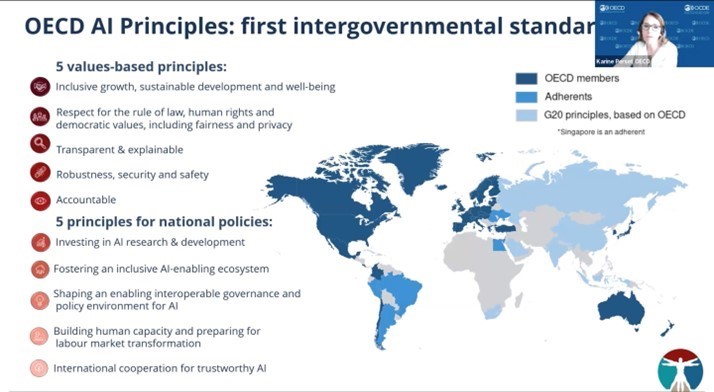What key processes led to OECD Responsible AI Principles? What organizations are forwarding global AI policy synergies, and how do we contribute to those efforts?
These questions animated webinar 2 of AI Connect (AIC2), a year-long initiative led by the US Department of State Bureau of Cyberspace and Digital Policy and the Atlantic Council GeoTech Center, held on April 10, 2024. After receiving an overview of the current state of AI governance, webinar 2 brought key stakeholders in the development of the OECD AI Principles, the Hiroshima Process and other multilateral and multistakeholder forums to discuss the conception and widespread application of the principles, while prompting participants to examine the implementation of global AI frameworks in their own national contexts.

The webinar began with a keynote by Dr. Mark Latonero, Head of International Engagement for the US AI Safety Institute. Dr. Latonero provided insight on the United States’ role in fostering international collaboration to mitigate AI risks, referencing the Blueprint for an AI Bill of Rights, NIST Risk Management Framework, and Executive Order on the Safe, Secure, and Trustworthy Development and Use of Artificial Intelligence.
Dr. Latonero’s keynote was followed by a panel discussion facilitated by Geotech Center Associate Director and Fellow, and AI Connect program lead Trisha Ray and featuring Karine Perset, the Head of AI in the Digital Economy Division of the OECD, Yoichi Ida, the Deputy Director-General for G7 and G20 relations at the Japanese Ministry of Internal Affairs and Communications, and Justin Fair, Director of Multilateral Affairs at the U.S. Department of State Bureau of Cyberspace and Digital Policy.
Perset provided an overview of the guiding principles and policies for OECD’s AI initiatives, while highlighting opportunities for international cooperation including the OECD AI Observatory and Working Party on AI Governance.
Ida, who has played a crucial role in the OECD’s foundational AI Principles, and the Hiroshima Process under the umbrella of the G7, shared Japan’s priorities for AI governance in international forums. Ida highlighted the iterative process of AI governance, providing insights on the Hiroshima process, which brought together a variety of stakeholders to the table. Justin Fair reiterated the value of Japan’s leadership when discussing the accomplishments of multilateral organizations in developing responsible AI policies.
It is going to take a collective effort of a lot of different experts, a lot of different organizations, and a lot of different stakeholders coming together and building on their strengths, their mandates, and their competencies, that creates an ecosystem that ensures AI is safe, secure, and trustworthy. – Justin Fair, Director of Multilateral Affairs at the US Department of State Bureau of Cyberspace and Digital Policy
AI Connect II’s multistakeholder approach to AI education and governance brings together leaders from across the global to advance responsible AI and digital freedom. This webinar provided context current AI frameworks, and access to a community dedicated to the effective implementation of the AI principles in their respective regions.
To keep up with the GeoTech Center’s latest work on artificial intelligence, join our mailing list below:
Stay connected
Sign up to join the Atlantic Council’s AI mailing list.
Related resources
Learn more from the resources referenced in AI Connect II Webinar 2.
- Hiroshima AI Process (G7 Plus): https://www.oecd-ilibrary.org/science-and-technology/g7-hiroshima-process-on-generative-artificial-intelligence-ai_bf3c0c60-en
- OECD AI Principles: https://oecd.ai/en/ai-principles
- OECD AI Observatory: https://oecd.ai/en/
- US AI Safety Institute: https://www.nist.gov/aisi
- White House Executive Order on AI: https://www.whitehouse.gov/briefing-room/presidential-actions/2023/10/30/executive-order-on-the-safe-secure-and-trustworthy-development-and-use-of-artificial-intelligence/


